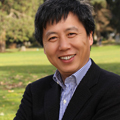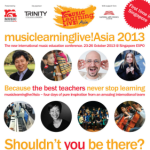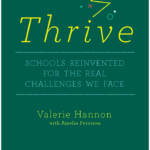
Recently, I was privileged to be able to interview one of the most stimulating and original thinkers in education, Prof. Yong Zhao. The interview was published in Music Education Asia, and is re-presented here with their kind permission:
“Leading thinker on educational policy and technology in education, Professor Yong Zhao, is a keynote speaker at musiclearninglive!Asia, a groundbreaking new international conference which takes place for the first time in Singapore this October. Here he talks global competence, entrepreneurialism and creativity with Programme Director, David Price OBE.
David Price: We’re really pleased you’ve agreed to be one of our keynote speakers at musiclearninglive!Asia. You’ve had first-hand experience of schooling in both Asia and the US – could you say a little about how each experience affected both your motivation to learn and your desire to work in education?
Yong Zhao: Thank you for having me. Having experienced both education systems has allowed me to see the advantages and disadvantages of different educational philosophies and practices. Education is essential for any individual and society but how it is practised leads to different types of talents and qualities in individuals and societies. The two education systems evolved in different contexts and have distinctly different features and, thus, different results. Seeing that both systems are trying to emulate the superficial elements of each other without a deep understanding of these contexts and features, I became worried that we may end with up something that takes us in the opposite direction of what we want. Thus, I began my journey to learn more about the underlying cultural and historical factors of the two education systems.
DP: Since the publication of Amy Chua’s book, Battle Hymn of the Tiger Mother, and the most recent PISA tables, there’s a sense in some Western countries that they are ‘falling behind’ Asian jurisdictions. I know you have strong views on how countries should avoid trying to match each other’s systems and scores. What are your views on the increasing pressure to ‘standardise’ the school experience and where is that pressure coming from? Is it parents, teachers, administrators, policy-makers?
YZ: Basically, what I have discovered, as have many other scholars, is that East Asian and US education systems (and, to some degree, other Anglo countries) have different definitions of educational success and have developed different mechanisms to ensure such success. Now, with international tests and the pressure that comes with an increasingly globalised economy, the US and other Western countries such as the UK have begun to be concerned about their educational quality due to their relatively poor performance in international tests. But such concerns are not warranted because education is much more than mastering the knowledge and cognitive skills to do well in tests on a few subjects.
What helps individuals and societies succeed includes exceptional talents, passion, creativity, entrepreneurial spirit, emotional intelligence and many other abilities, perspectives, and attitudes that have not been, or may never be properly, tested. A broad and flexible curriculum, a happy and engaging school experience and a healthy and forgiving education arrangement are essential to preserve and cultivate a diversity of human talents, passion and curiosity as well as creativity and the entrepreneurial spirit. To ‘standardise’ the school experience may help an education system or school to move up its average test scores but it can seriously hurt other aspects of humanity.
DP: It sometimes feels as though the US and Chinese systems are trying to copy each other – which is heading in the right direction? (Interestingly, the halfway point between Washington DC and Beijing is Helsinki!)
YZ: If you are hinting that Finland may be the optimal education system with the suggestion that Helsinki is halfway between Beijing and Washington DC, I must respectfully disagree. Finland has a great education but it is not a model for everyone else for various reasons. One thing I’ve noticed that scholars have talked about is the lack of attention to gifted and talented students. In other words, while we move a whole education system up for everyone, we may risk sacrificing exceptionality for the sake of homogeneity. I think each country should examine their own societal context and work to become their own best, not best judged by so-called international standards or benchmarks.
DP: Your most recent book, World Class Learners: Educating Creative and Entrepreneurial Students, argues for a more creative and entrepreneurial education as a way of preparing students for the future. Why is that important and what role might the arts have to play in that?
YZ: In my book, I propose that future citizens have to be globally competent, entrepreneurial and creative (GEC, for short) because technology and globalisation have changed our society and caused the disappearance of traditional lines of jobs that require routine skills – and the trend will continue. In the meantime, these changes have extra-ordinarily expanded the spectrum of talents and skills that are valuable. In other words, what may have been of little value has become valuable.
Thus, to win the race against technology, human beings must be able to do things that machines cannot – and that is creative and entrepreneurial work. We also need to begin to value what schools have traditionally ignored, for example, the arts. Hence, a broad curriculum, including the arts, is necessary to both cultivate creativity and open doors to children who may otherwise not be talented in the traditional subjects. Today’s society needs a lot more art professionals than 100 years ago.
DP: Music often finds itself on the fringes of national curriculums. In countries like the UK, it’s being squeezed out of the common core. What would your advice be to music advocates? Should we, for example, be arguing ‘art for art’s sake’? Or do we need to demonstrate how it builds other, non-artistic skills and attitudes?
YZ: Well, that’s happening in the US as well. I am sad to see it happening. Although I am not good at any arts-related field, I want to defend it for children who are interested in it. Regarding music, I think music in and of itself is valuable. While justifying music by demonstrating its effects on other skills and attitudes may be a good political strategy, I think music educators should argue that music is in itself important for two reasons. First, it is a fundamental element of human experience. Human beings cannot live without music! Second, there are plenty of children who are good at music and interested in it; public schools should not deprive them of the opportunity to learn and experience music.
DP: At musiclearninglive!Asia, you’ll get a chance to meet music educators from around the world and engage in discussions around pedagogy. What are your personal music passions and how do you think music teaching should adapt to help deliver the kinds of creative, entrepreneurial students we need for the future?
YZ: As I said, I am not good at music at all but it may be due to the fact that I grew up without it. I might have become a Justin Bieber or an Elvis Presley if I’d had access to music and YouTube in my little village in China but I did not and now I will never know. This is why I would like schools to offer those opportunities to all children. But music education itself needs to change as well. Not all music education cultivates creativity and, in fact, it sometimes is too rigid and discourages variation and imagination. So I would like to see music education – just education in other domains – change to focus more on the passion, creativity and entrepreneurial spirit of human beings than just making sure children develop the skills.”



